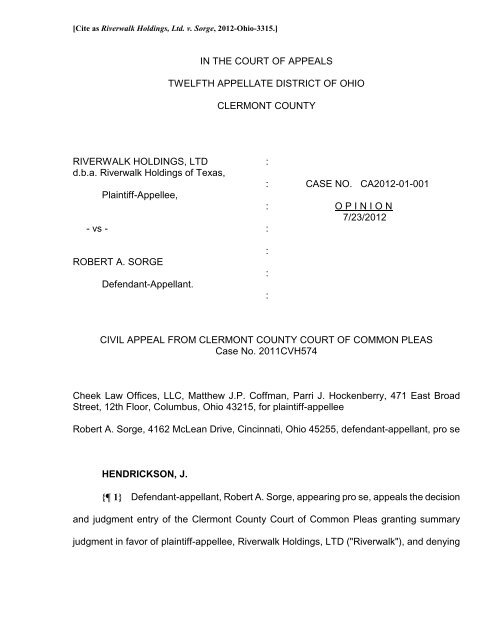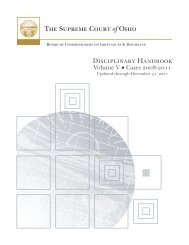Riverwalk Holdings, Ltd. v. Sorge - Supreme Court
Riverwalk Holdings, Ltd. v. Sorge - Supreme Court
Riverwalk Holdings, Ltd. v. Sorge - Supreme Court
Create successful ePaper yourself
Turn your PDF publications into a flip-book with our unique Google optimized e-Paper software.
[Cite as <strong>Riverwalk</strong> <strong>Holdings</strong>, <strong>Ltd</strong>. v. <strong>Sorge</strong>, 2012-Ohio-3315.]<br />
IN THE COURT OF APPEALS<br />
TWELFTH APPELLATE DISTRICT OF OHIO<br />
CLERMONT COUNTY<br />
RIVERWALK HOLDINGS, LTD :<br />
d.b.a. <strong>Riverwalk</strong> <strong>Holdings</strong> of Texas,<br />
: CASE NO. CA2012-01-001<br />
Plaintiff-Appellee,<br />
: O P I N I O N<br />
7/23/2012<br />
- vs - :<br />
ROBERT A. SORGE<br />
Defendant-Appellant.<br />
:<br />
:<br />
:<br />
CIVIL APPEAL FROM CLERMONT COUNTY COURT OF COMMON PLEAS<br />
Case No. 2011CVH574<br />
Cheek Law Offices, LLC, Matthew J.P. Coffman, Parri J. Hockenberry, 471 East Broad<br />
Street, 12th Floor, Columbus, Ohio 43215, for plaintiff-appellee<br />
Robert A. <strong>Sorge</strong>, 4162 McLean Drive, Cincinnati, Ohio 45255, defendant-appellant, pro se<br />
HENDRICKSON, J.<br />
{ 1} Defendant-appellant, Robert A. <strong>Sorge</strong>, appearing pro se, appeals the decision<br />
and judgment entry of the Clermont County <strong>Court</strong> of Common Pleas granting summary<br />
judgment in favor of plaintiff-appellee, <strong>Riverwalk</strong> <strong>Holdings</strong>, LTD ("<strong>Riverwalk</strong>"), and denying
- 2 -<br />
Clermont CA2012-01-001<br />
appellant's motion for summary judgment. We affirm the decision of the trial court. 1<br />
{ 2} <strong>Riverwalk</strong> initiated this action on January 13, 2011, against appellant in<br />
Hamilton County to recover for appellant's failure to pay on a credit card account. Because it<br />
was not filed in the proper venue, the case was transferred to Clermont County. The parties<br />
exchanged discovery and both parties filed for summary judgment. The trial court issued a<br />
decision on December 7, 2011, finding in favor of <strong>Riverwalk</strong> and against appellant in the<br />
amount of $24,422.06 plus accrued interest of $14,416.37, plus future interest at a rate of<br />
18%, and court costs. 2<br />
{ 3} Appellant appeals the trial court's decision on summary judgment, raising the<br />
following two assignments of error:<br />
{ 4} Assignment of Error No. 1:<br />
{ 5} THE TRIAL COURT ERRED BY DENYING APPELLANT'S MOTION FOR<br />
SUMMARY JUDGMENT.<br />
{ 6} Assignment of Error No. 2:<br />
{ 7} THE TRIAL COURT ERRED BY GRANTING RIVERWALK'S MOTION FOR<br />
SUMMARY JUDGMENT.<br />
{ 8} In his first assignment of error, appellant argues that the trial court erred by<br />
denying his motion for summary judgment. Specifically, appellant states that <strong>Riverwalk</strong><br />
refused to answer discovery requests and that <strong>Riverwalk</strong> and its predecessor, US Bank, are<br />
not legally permitted to collect the debt in question. Therefore, appellant contends that his<br />
motion should have been granted.<br />
1. Pursuant to Loc.R. 6(A), we have sua sponte removed this appeal from the accelerated calendar.<br />
2. At oral argument a concern arose regarding whether the trial court's December 7, 2011 decision was a final<br />
appealable order. After further review of the record, the decision states the amount due on the credit card<br />
account within its body and then states that appellee is granted summary judgment "in all respects." As such,<br />
this decision is a final appealable order.
- 3 -<br />
Clermont CA2012-01-001<br />
{ 9} This court reviews a trial court's decision on summary judgment under a de<br />
novo standard of review. Discover Bank v. Brockmeier, 12th Dist. No. CA2006-057-078,<br />
2007-Ohio-1552, 6. "Summary judgment is proper when: (1) there is no genuine issue of<br />
material fact; (2) the moving party is entitled to judgment as a matter of law; and (3)<br />
reasonable minds can only come to a conclusion adverse to the party against whom the<br />
motion is made, construing the evidence most strongly in that party's favor." Id.; Civ.R.<br />
56(C). The party requesting summary judgment bears the initial burden of informing the<br />
court of the basis for the motion and identifying those portions of the record that demonstrate<br />
the absence of a genuine issue of material fact as to the essential elements of the<br />
nonmoving party's claims. See FT Mortgage Companies v. Williams, 12th Dist. No. CA2000-<br />
09-023, 2001-Ohio-8694; Dresher v. Burt, 75 Ohio St.3d 280, 293 (1996).<br />
{ 10} In this case, appellant's motion stated that <strong>Riverwalk</strong> failed to provide discovery<br />
in the form of a completed credit card application containing appellant's signature pursuant to<br />
12 C.F.R. 226.5(a) and all credit history for the credit card for the past six years pursuant to<br />
R.C. 1109.69. Based upon these failures, appellant requested judgment as a matter of law.<br />
No affidavits or attachments accompanied the motion.<br />
{ 11} We first note that "[f]ailure to support a motion for summary judgment with an<br />
affidavit is not of itself fatal as the rule provides a movant 'may' provide supporting affidavits."<br />
Pond v. Carey Corp., 34 Ohio App.3d 109, 111 (10th Dist.1986); Civ.R. 56(C). "However,<br />
there must be other sufficient evidence upon which the court could reach a conclusion<br />
regarding the facts in order to properly rule that there were no issues upon which reasonable<br />
minds could differ." Id. In this case, appellant failed to support his motion with any evidence.<br />
As such, the trial court did not err in denying appellant’s motion for summary judgment.<br />
{ 12} Yet, even had appellant supported his motion with evidence, the trial court's<br />
denial of appellant's motion for summary judgment was still proper, as appellant was never
- 4 -<br />
Clermont CA2012-01-001<br />
entitled to the discovery materials he claims were imperative to his case, and the trial court<br />
denied a motion to compel this discovery material on December 1, 2011. 3 Therefore,<br />
appellant's first assignment of error is overruled.<br />
{ 13} In his second assignment of error, appellant argues that the trial court erred in<br />
granting <strong>Riverwalk</strong>'s motion for summary judgment. Specifically, appellant states that there<br />
were numerous questions of fact regarding payments and charges on the credit card and,<br />
without a proper answer to appellant's discovery requests, these questions of fact could not<br />
have been properly addressed. Appellant fails, however, to elaborate on these numerous<br />
questions of fact.<br />
{ 14} As stated above, the party moving for summary judgment bears the burden of<br />
demonstrating a lack of genuine issues of material fact. See Dresher, 75 Ohio St.3d at 293.<br />
In this case, <strong>Riverwalk</strong>'s motion for summary judgment stated that appellant was issued a<br />
credit card by US Bank and had subsequently defaulted on his obligation to pay for the<br />
goods and services purchased with the credit card. The motion was supported by an affidavit<br />
from a representative of <strong>Riverwalk</strong>, copies of the assignments establishing <strong>Riverwalk</strong> as<br />
owner of the claim, copies of cardholder statements and payments establishing the amount<br />
due, and a copy of the Terms and Conditions or Cardholder Agreement. In response to this<br />
motion, appellant continued to argue, without evidentiary support, that <strong>Riverwalk</strong> failed to<br />
provide proper discovery.<br />
{ 15} Once a party moving for summary judgment has satisfied its initial burden to<br />
establish a lack of genuine issues of material fact, the nonmoving party has the reciprocal<br />
burden to set forth specific facts showing that genuine issues remain. Id.; Civ.R. 56(E).<br />
3. 12 C.F.R. 226.5(a) relates to information which must be provided to a credit or charge card recipient at the<br />
time of solicitation, not at the time payment is requested. Further, R.C. 1109.69 does not include a "credit<br />
history" as an item which must be retained by a bank for six years.
- 5 -<br />
Clermont CA2012-01-001<br />
Summary judgment is proper if the party opposing the motion fails to set forth such facts. Id.<br />
{ 16} <strong>Riverwalk</strong> set forth facts indicating that a credit card agreement was entered<br />
into by US Bank and appellant, that appellant defaulted on payments, and that the debt was<br />
assigned to <strong>Riverwalk</strong>. Thus, <strong>Riverwalk</strong> met its burden of establishing a lack of genuine<br />
issues of material fact. Appellant then failed to provide any specific facts showing that<br />
genuine issues remain, arguing only that additional discovery would demonstrate genuine<br />
issues of material fact. As it was previously determined that appellant was not entitled to the<br />
discovery requested, and appellant failed to submit any other evidence establishing a<br />
genuine issue of material fact, the trial court did not err in granting <strong>Riverwalk</strong>'s motion for<br />
summary judgment. Therefore, appellant's second assignment of error is overruled.<br />
{ 17} Judgment affirmed.<br />
POWELL, P.J., and PIPER, J., concur.

















